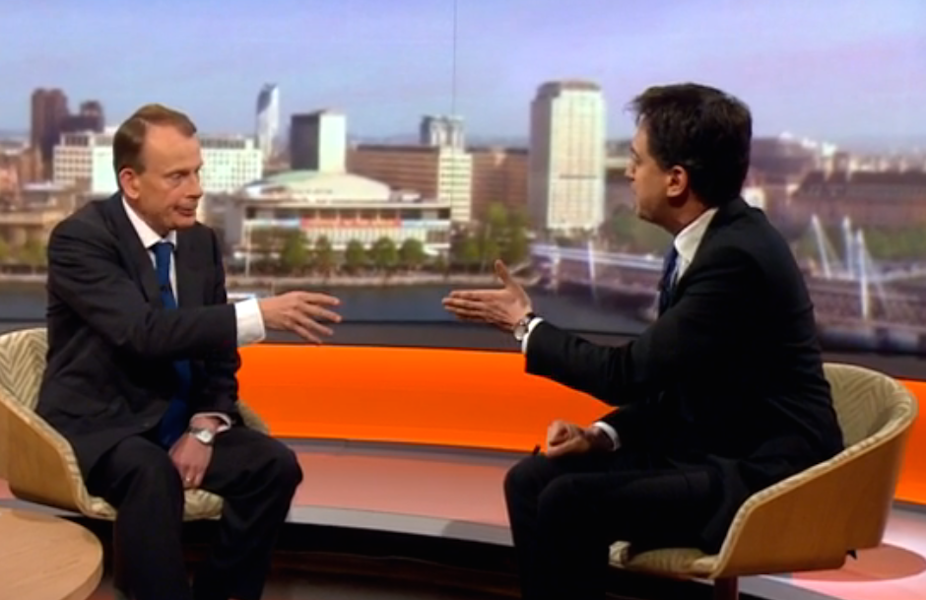Ed Miliband’s pronouncement on The Andrew Marr Show that even a confidence and supply arrangement between Labour and the Scottish National Party (SNP) is a non-starter is yet another reminder of the high intrigue and excitement around this election.
The 2010 election might have at least raised the prospect of a change of government at UK level, but it was very dull in Scotland. No seats changed hands at all. The SNP added two points to its 2005 performance to reach 19.9% of the vote, but despite having taken charge of the Scottish government in the interim, this still translated into just six out of 59 Scottish seats in Westminster.
Before the polls began consistently pointing to an SNP landslide this time around, remember that the party is usually Holyrood-strong and Westminster-weak. It last did well at Westminster in October 1974, but even that performance looks set to be completely overshadowed on May 7. The latest poll from TNS is forecasting a 54% share and 57 seats. One from Panelbase over the weekend forecast 48% and 53 seats.
The Mili-move
Miliband’s statement about confidence and supply reflects the fact that there is a completely different election going on in England. Both the Tories and UKIP are fighting it out for the English nationalist vote. They are using Labour’s misfortunes in Scotland as a stick with which to implicitly beat each other over who represents English interests more, as well as an opportunity to cause as much problems for Miliband as possible.
Labour’s problem is that whatever Miliband is saying for electoral purposes now, his party is in a difficult place tactically. He tries to escape the SNP problem by stating that his aim is a majority government, but this has proved insufficient. In March he ruled out a coalition with the SNP. Now he appears to have been persuaded to go further.
This is necessary to defend the party in England and Scotland. It leaves Miliband some wiggle room for one-off deals with the Scottish nationalists, perhaps as part of a wider strategy of ad-hoc deal-making with other parties including the Lib Dems. But if this the plan, it looks risky. The prospect of the government collapsing would always be in the background. Labour’s other option would be to risk the wrath of the electorate and U-turn on confidence and supply. We all know that what parties say during the campaign is not necessarily what they will say after the votes are counted, but this too now looks difficult.
As SNP leader Nicola Sturgeon responded over the weekend, Miliband would “have to change his tune” after the election. At that point the SNP will be down in London in force, ready to negotiate. Unless Labour wants a repeat of its post-election failure to reach a deal with the Liberal Democrats, SNP and Plaid Cymru in 2010, it would do well to face the reality of the situation. When Labour spurned Alex Salmond’s efforts to create a progressive alliance against the Tories after the 2010 general election, we know what happened next.
Sturgeon tactics
The SNP has been tactically adept in two ways. In relation to policy and messaging, it sent out a clear anti-austerity message and put forward a range of progressive policies that overlap with Labour on zero-hours contracts, equality, childcare, the minimum wage and so forth. There are policy deals to be done here between the two parties.
It also sent clear messages that it would support a minority Labour government at Westminster – topped by a personal invitation to Miliband delivered by Sturgeon live on TV in the opposition leader’s debate. Scottish Labour’s main pitch to “vote Labour to get the Tories out” was therefore blunted. The SNP’s moves to rule out any deal with the Tories and promise to vote down a Conservative minority government underlined the message.
Having said all that, the post-election period remains both fluid and potentially dangerous for the SNP. Assuming it is in a position to have influence at Westminster, it might face difficulties on the compromises it has to make with Labour on policy – a lesson the Lib Dems are having to learn the hard way. The party will also need to handle the nuclear option of voting against a minority Labour government with extreme care.
The challenge for the SNP will be to deliver policy benefits and more devolved powers while preventing a Westminster blowback on negative issues and decisions. Regardless of the party’s popularity in Scotland at present, steering the right course will require the utmost political finesse.
In the meantime the Conservatives have put the union under pressure with their stance at the election – but Labour much less so. The appearance of a large group of SNP MPs will add to the pressure after the election. The new government will need to deal with that reality without further damage to the UK.

